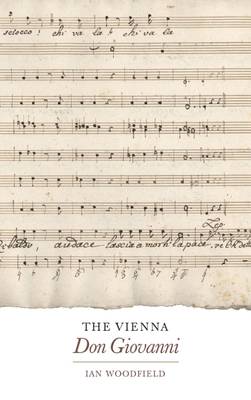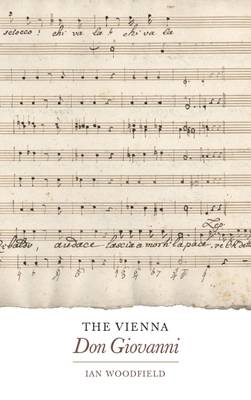
Door een staking bij bpost kan je online bestelling op dit moment iets langer onderweg zijn dan voorzien. Dringend iets nodig? Onze winkels ontvangen jou met open armen!
- Afhalen na 1 uur in een winkel met voorraad
- Gratis thuislevering in België vanaf € 30
- Ruim aanbod met 7 miljoen producten
Door een staking bij bpost kan je online bestelling op dit moment iets langer onderweg zijn dan voorzien. Dringend iets nodig? Onze winkels ontvangen jou met open armen!
- Afhalen na 1 uur in een winkel met voorraad
- Gratis thuislevering in België vanaf € 30
- Ruim aanbod met 7 miljoen producten
Zoeken
Omschrijving
Aspects of Don Giovanni's compositional history are uncovered and the study provides for detailed evidence with which to evaluate Da Ponte's recollections. The essential truth of his account - that the revision of the operain Vienna was an interactive process - seems to be fully borne out. A general theory of transmission is proposed, which clarifies the relationship between the fluid text produced by re-creation and the static text generated by replication. In the year following its 1787 Prague première, Don Giovanni was performed in Vienna. Everyone, according to the well-known account by Da Ponte, thought something was wrong with it. In response, Mozart made changes, producing a Vienna 'version' of the opera, cutting two of the original arias but inserting three newly-composed pieces. The dilemma faced by musicians and scholars ever since has been whether to preserve the opera in these two 'authentic' forms, or whether to fashion a hybrid text incorporating the best of both.
This study presents new evidence about the Vienna form of the opera, based on the examination of late eighteenth-century manuscript copies. The Prague Conservatory score is identified as the primary exemplar for the Viennese dissemination of Don Giovanni, which is shown to incorporate two quite distinct versions, represented by the performing materials in Vienna [O.A.361] and the early Lausch commercial copy in Florence. To account for this phenomenon, seen also in early sources of the Prague Don Giovanni and Così fan tutte, a general theory of transmission for the Mozart Da Ponte operas is proposed, which clarifies the relationship between the fluid text produced by re-creation (performing) and the static text generated by replication (copying). Aspects of the compositional history of Don Giovanni are uncovered. Evidence to suggest that Mozart first considered an order in which Donna Elvira's scena precedes the comic duet 'Per queste tue manine' is assessed. The essential truth of Da Ponte's account - that the revision of the opera in Vienna was an interactive process, involving the views of performers, the reactions of audiences and the composer's responses - seems to be fully borne out. The final part of the study investigates the late eighteenth-century transmission of Don Giovanni. The idea that hybrid versions gained currency only in the nineteenth century or in the lighter Singspiel tradition is challenged. IAN WOODFIELD is Professorand Director of Research at the School of Music and Sonic Arts, Queen's University Belfast.
This study presents new evidence about the Vienna form of the opera, based on the examination of late eighteenth-century manuscript copies. The Prague Conservatory score is identified as the primary exemplar for the Viennese dissemination of Don Giovanni, which is shown to incorporate two quite distinct versions, represented by the performing materials in Vienna [O.A.361] and the early Lausch commercial copy in Florence. To account for this phenomenon, seen also in early sources of the Prague Don Giovanni and Così fan tutte, a general theory of transmission for the Mozart Da Ponte operas is proposed, which clarifies the relationship between the fluid text produced by re-creation (performing) and the static text generated by replication (copying). Aspects of the compositional history of Don Giovanni are uncovered. Evidence to suggest that Mozart first considered an order in which Donna Elvira's scena precedes the comic duet 'Per queste tue manine' is assessed. The essential truth of Da Ponte's account - that the revision of the opera in Vienna was an interactive process, involving the views of performers, the reactions of audiences and the composer's responses - seems to be fully borne out. The final part of the study investigates the late eighteenth-century transmission of Don Giovanni. The idea that hybrid versions gained currency only in the nineteenth century or in the lighter Singspiel tradition is challenged. IAN WOODFIELD is Professorand Director of Research at the School of Music and Sonic Arts, Queen's University Belfast.
Specificaties
Betrokkenen
- Auteur(s):
- Uitgeverij:
Inhoud
- Aantal bladzijden:
- 232
- Taal:
- Engels
Eigenschappen
- Productcode (EAN):
- 9781843835868
- Verschijningsdatum:
- 18/11/2010
- Uitvoering:
- Hardcover
- Formaat:
- Ongenaaid / garenloos gebonden
- Afmetingen:
- 155 mm x 234 mm
- Gewicht:
- 498 g

Alleen bij Standaard Boekhandel
+ 354 punten op je klantenkaart van Standaard Boekhandel
Beoordelingen
We publiceren alleen reviews die voldoen aan de voorwaarden voor reviews. Bekijk onze voorwaarden voor reviews.











